Young disabled face more mental health concerns and are often bullied

Young people with disability are more likely to report personal concerns relating to mental health and are twice as likely to have experienced bullying in the past year and to feel sad about their life than their peers according to Mission Australia’s Young, Willing and Able - Youth Survey Disability Report 2019 released today.
For the first time, Mission Australia has analysed their Youth Survey data with a focus on young people with disability and how their experiences differ to young people without disability. In response to the findings, Mission Australia is calling for greater consultation and collaboration with young people with disability and more action to address their concerns, improve their wellbeing, and remove the physical, structural and social barriers that impact their lives.
The data about young people with disability aged between 15 and 19 comes from more than 25,000 responses to Mission Australia’s Youth Survey 2019, of which 1,623 reported a disability.
The report found young people with disability are more likely to express personal concerns that relate to mental health than their peers, indicating personal concerns about mental health (45.5 per cent compared with 32.4 per cent*), suicide (25.6 per cent compared with 13.5 per cent*) and bullying/emotional abuse (25.5 per cent compared with 13.6 per cent*). Young people with disability reported they are twice as likely as their counterparts to feel sad or very sad about their life as a whole (24.1 per cent compared with 10.1 per cent*), and feel negative or very negative about the future (26.0 per cent compared with 11.2 per cent*).
The findings also expose the fact that young people with disability are twice as likely to have experienced bullying in the past 12 months than their peers without disability, with two in five young people with disability reporting this (43.4 per cent compared with 19.3 per cent).
Mission Australia CEO, James Toomey said: “Overwhelmingly, these findings show young people with disability are more concerned about a range of issues. Young people with disability are telling us loud and clear that their experience of growing up and living with disability in Australia is impacting negatively on their lives, their mental wellbeing and their belief in their ability to achieve their goals.
“These Youth Survey findings pinpoint that young people with disability don’t have the same access to opportunities as their peers. They need more access to vital opportunities so they can better connect with their communities, friends and families and lead fulfilling lives and thrive into the future.
“We must act now to ensure a whole of community approach across all life domains, and consult with young people with disability, so we can work together to foster true inclusion and accessibility and better support young people with disability as they transition to adulthood.
Encouragingly, the results show the majority of young respondents with disability are engaged in education with eight in 10 studying full time (84.6 per cent) and their top post-school plan is to go to university with half citing this plan (48.3 per cent). Compared to young people without disability, however, more than twice the proportion of young people with disability reported they are not studying (9.4 per cent compared with 3.6 per cent*) and are therefore at higher risk of educational disengagement.
More than six in 10 (63.7 per cent) young people with disability also face a range of barriers to achieving their post-school plans such as mental health (27.7 per cent compared with 16.0 per cent*) and academic ability (24.5 per cent compared with 20.0 per cent*), with three times the proportion of respondents with disability seeing physical health as a barrier to achieving their goals after school (12.4 per cent compared with 4.0 per cent*).
Mr Toomey continued, “In consultation with young people with disability, there should be a National Education Strategy in place which increases awareness about the Disability Standards for Education, ensures additional support at schools and other educational settings, and increases the flexibility of education opportunities, so that young people with disability can learn and study in a way that is matched to their needs.
“Developing a National Jobs Plan with an aim to improve employment services for young people with disability as well as a national advertising campaign to promote employment of people with disability would also go a long way in improving employment opportunities and satisfaction.”
*Compared with respondents without disability
Mission Australia’s Youth Survey 2020 is currently open to all young people aged 15-19 years-old who are living in Australia until 14 August. To take part in the survey, visit www.missionaustralia.com.au/youthsurvey.